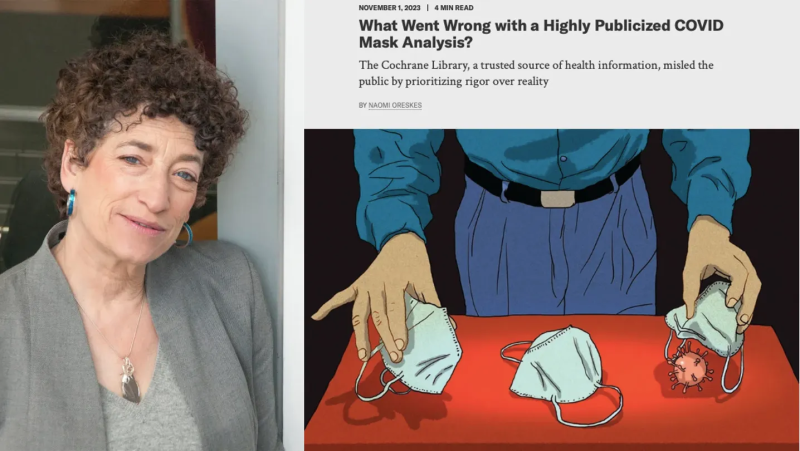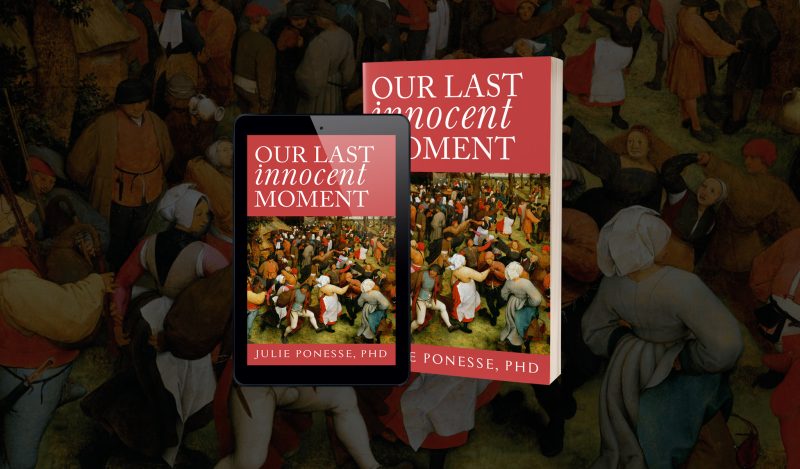Naomi Oreskes, well-known science historian and co-author of Merchants of Doubt, argues that the public was “misled” by the 2023 Cochrane review, which concluded that wearing a face mask “probably makes little or no difference” in preventing SARS-CoV-2 transmission.
In an article published by Scientific American, Oreskes writes that “the average person could be confused” by the Cochrane study because its method of synthesising evidence prioritised “rigor over reality.”

Oreskes criticises the Cochrane review for basing its findings “on randomized controlled trials, often called the ‘gold standard’ of scientific evidence,” and said the analysis ignored “epidemiological evidence because it didn’t meet its rigid standard.”
Oreskes concludes that Cochrane got it wrong because its methods are too rigorous and that “it’s time those standard procedures were changed.”
Peter Gøtzsche, a physician scientist who co-founded the Cochrane Collaboration in 1993 and an expert in research methodology, says he is “stunned” by her comments.
“It’s clear that Oreskes lacks scientific objectivity,” says Gøtzsche in a stinging rebuke. “Oreskes is actually arguing that the researchers should have lowered their standards and relied on weaker evidence in their review.”

Oreskes cites a string of observational studies to support the use of face masks in preventing the spread of viruses. But Gøtzsche says the problem with observational studies is that “they’re often wrong.”
“Observational studies have multiple confounding factors that are difficult to control, which is often why you cannot establish a cause-and-effect relationship,” he explains.
“People argue that studies would show masks are effective if only people wore them correctly, but that’s nonsense,” says Gøtzsche. “If people won’t wear masks correctly, then that tells you that it’s not going to be an effective public health measure and shouldn’t be used.”
The CDC has published multiple observational studies in its Morbidity and Mortality Weekly Report (MMWR), which has substantial influence on US health policy and is widely cited as evidence of mask effectiveness.
But an analysis by Høeg et al, published in Am J Med found that “MMWR publications pertaining to masks drew positive conclusions about mask effectiveness >75% of the time despite only 30% testing masks and <15% having statistically significant results.”
Two randomised controlled trials on masking were carried out during the Covid pandemic – one in Denmark and the other in Bangladesh– but both had underwhelming outcomes.
Oreskes castigates Tom Jefferson, lead author on the Cochrane study, for saying that wearing a face mask “makes no difference – none of it” and that he made “the classic error of conflating absence of evidence with evidence of absence.”
But Gøtzsche says, “There is not an absence of evidence. There is evidence from randomised trials, including those trying to prevent influenza transmission, and it shows that masks just don’t work.”
They Knew All Along….
The reality is that health authorities knew there was no evidence that face masks could stop viral transmission during a pandemic.
In February 2020 for example, then US surgeon general Jerome Adams urged Americans against using face masks. “Seriously people—STOP BUYING MASKS!” They are NOT effective in preventing general public from catching #Coronavirus,” he blasted in a tweet.
In March 2020, a WHO official said, “There is no specific evidence to suggest that the wearing of masks by the mass population has any potential benefit. In fact, there’s some evidence to suggest the opposite in the misuse of wearing a mask properly or fitting it properly.”
England’s then deputy chief medical officer Dame Jenny Harries agreed, saying that masks in the community could cause harm by giving people “a false sense of security.” She warned, “The average member of the public walking down the street [wearing a mask] is really not a good idea.”
And Anthony Fauci who was then director of NIAID, told 60 Minutes, “Right now in the United States, people should not be walking around with masks.”
Fast-forward several weeks and the narrative suddenly changed. Not only did health officials flip on their advice, but they also pushed for masks to be mandatory in hospitals, outdoor settings, and schools for young children.
In hindsight, it was bad advice.
A new systematic review by Sandlund et al published in BMJ’s Archives of Diseases in Childhood shows that public health officials were wrong to mandate masks for children due to an absence of high quality evidence.
The authors write, “In medicine, new interventions with unknown benefit but known or potential risks cannot be ethically recommended or enforced until absence of harm is demonstrated.”
The study outlines “an extensive body of research” suggesting the harms associated with children wearing masks, and adds “we fail to find any evidence of benefit from masking children, to either protect themselves or those around them, from covid-19.”
The authors conclude that “recommending child masking does not meet the accepted practice of promulgating only medical interventions where benefits clearly outweigh harms.”
Gøtzsche agrees, “Forcing people to wear masks has been a failure of public health. The reason we are still having the mask debate is because authorities relied on trash studies to justify their use, and wanted to appear as if they were doing something. In a crisis, it is always more difficult to do nothing.”
Republished from the author’s Substack
Published under a Creative Commons Attribution 4.0 International License
For reprints, please set the canonical link back to the original Brownstone Institute Article and Author.









